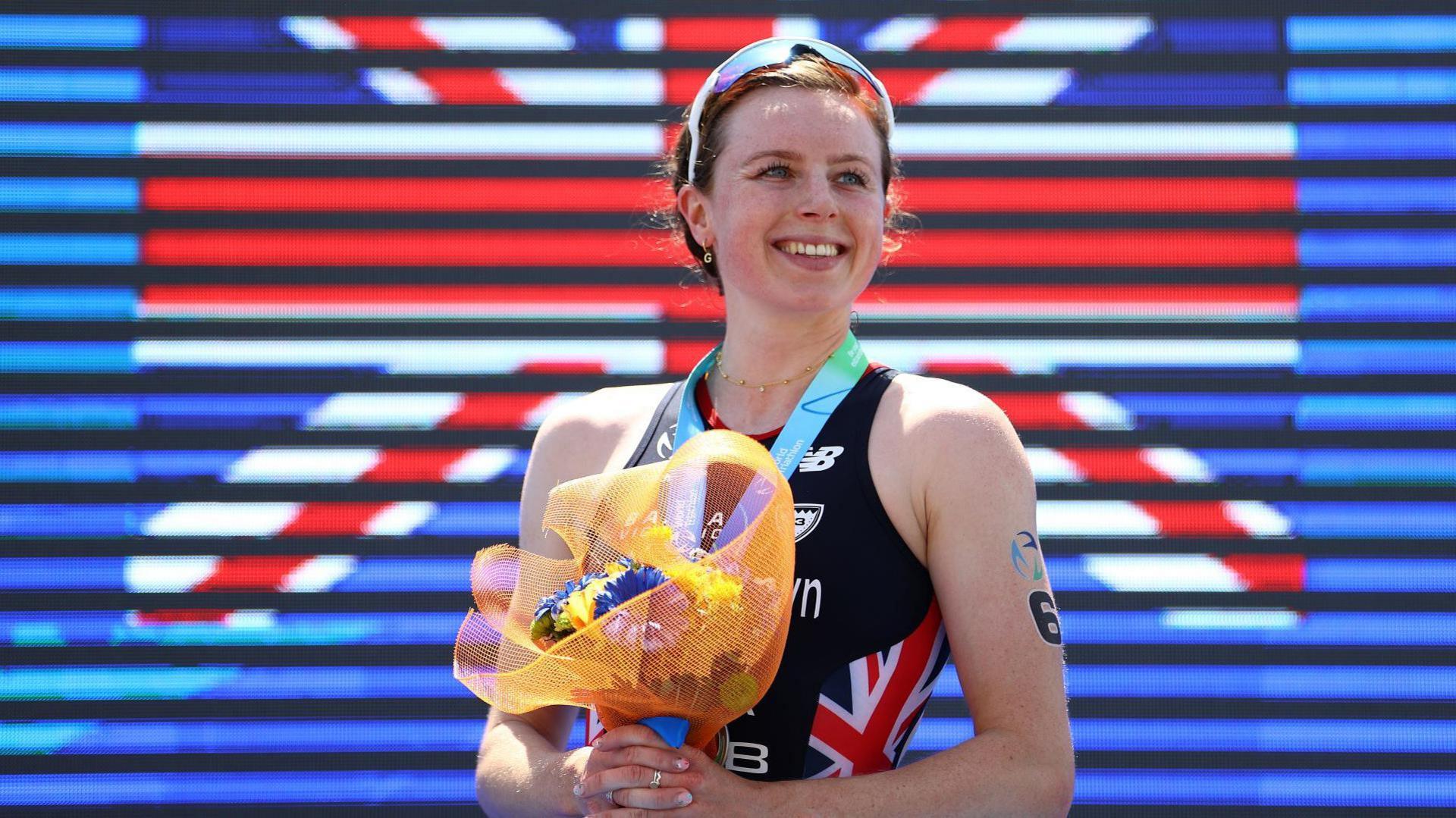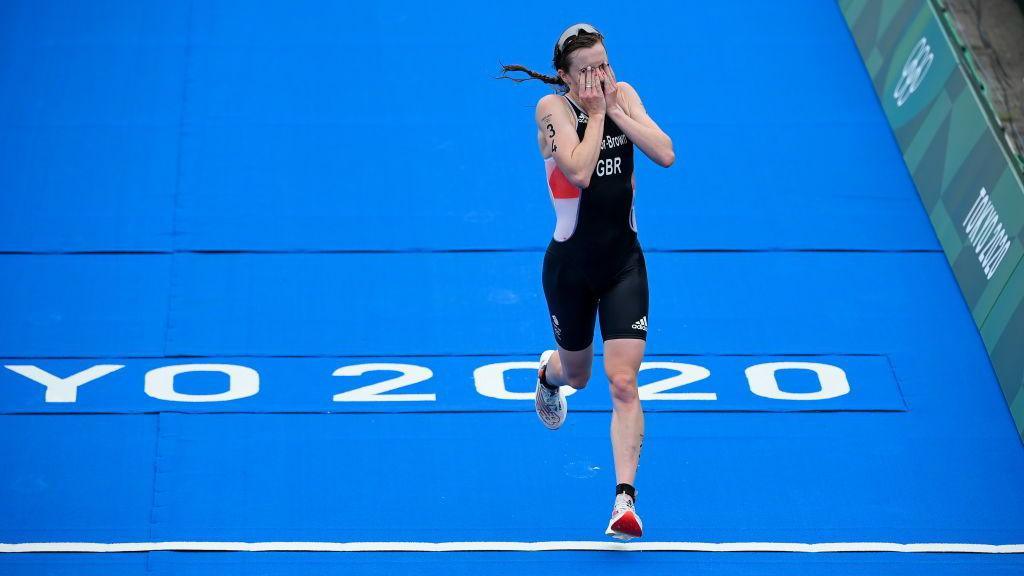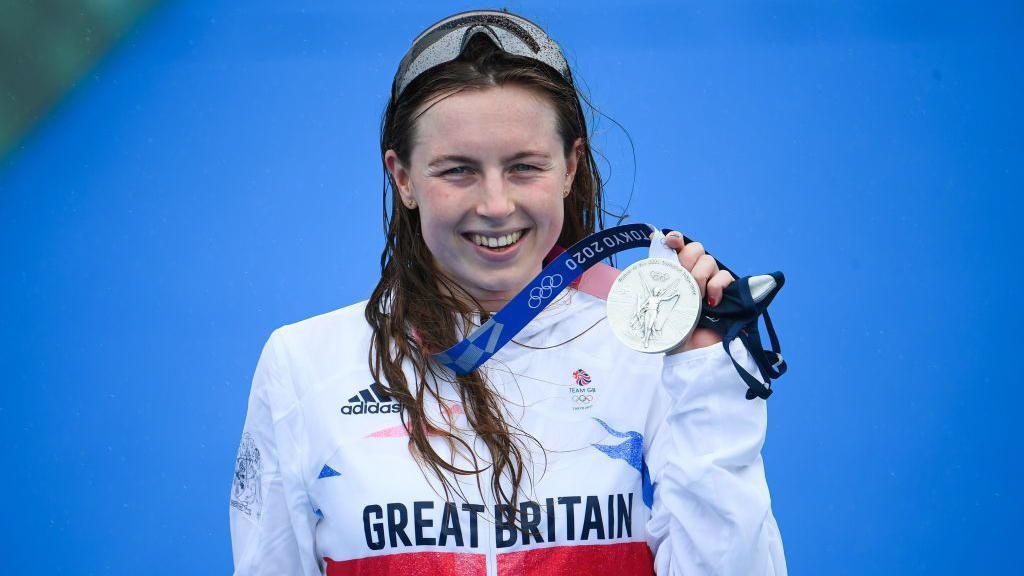'I had to shut down & fully recover' - Taylor-Brown eyes Olympic spot

Follow coverage of the Cagliari World Triathlon Championship Series on BBC Red Button and the BBC Sport website and app from 09:35 BST on Saturday
- Published
Overcoming adversity has been a central theme in Georgia Taylor-Brown's journey - whether that's chasing Olympic gold, or more important matters.
The British triathlete was on crutches after injury struck 11 weeks before Tokyo 2020 and, amid the remnants of a tropical storm, a mid-race puncture dashed her hopes of gold.
Remarkably, Taylor-Brown recovered to achieve silver, and four days later helped Team GB to a historic mixed relay gold.
But the true extent of the ongoing hardship she faced was yet to surface.
At home, her long-term partner struggled with mental health issues. That relationship ended in 2022, yet the toll it had taken - emotionally and physically - was still revealing itself.
In the years since her Tokyo successes the 2020 world champion has continued to encounter setbacks, losing the second half of the 2023 season after tearing her calf.
But before her bid to qualify for Paris 2024 this weekend, Taylor-Brown is now both injury-free and - most crucially - happy.
"I think the body has a good way of telling you enough is enough. Getting injured last year was my body's way of telling me I was still trying to push through and 'now we are going to stop'," Taylor-Brown, 30, tells BBC Sport.
"I went through a dark patch at the end of 2022. Racing was difficult because I didn't want to be there. I hated it. I wanted to lock myself in my room and shut everyone out, but I had a job to do.
"It was a difficult time. I had been performing well but it got to a point where I couldn't do it anymore. I didn't want people to know that was my personal life. When I couldn't really hide it any more, I had to get help.
"I had to shut down and fully recover from it all. I have found someone who loves me a lot. I feel like I'm in such a safe, happy place and I'm excited for life, which is a nice thing to be able to say."

Taylor-Brown was emotional as she crossed the line for silver at Tokyo 2020
Taylor-Brown's then partner, former Team Sky cyclist Josh Edmondson, told BBC Sport in 2017 that his use of the controversial painkiller Tramadol had led to severe depression.
Following Olympic glory, Taylor-Brown says she "couldn't enjoy that period" amid her ongoing domestic situation.
While triathlon had for a long time offered a form of escape, it was those issues away from sport which continued to occupy her mind as she attempted to perform.
"I was investing a lot of time helping him to get better. I thought I could save him," says Taylor-Brown.
"Even when I was out the house I was always worried about whether he was OK.
"I am never going to say I understand what people are going through with mental health issues because I never have [gone through it], not to that degree anyway. But I have learned a lot."
Taylor-Brown has since begun to appreciate the magnitude of her achievements three years ago.
Left with just five weeks to prove her fitness - after a stress response in her leg disrupted her preparations for an Olympic debut - she trailed in fifth after riding the final two kilometres of the cycle with a flat tyre on rain-soaked roads, but overhauled all but Bermuda's Flora Duffy on the concluding 10km run for silver.
Alongside team-mates Jessica Learmonth, Jonny Brownlee and Alex Yee, she was then part of history as GB won the inaugural Olympic triathlon mixed relay.
"I think I'm only starting to really respect and appreciate what I did now," Taylor-Brown says.
"Everything seemed to go wrong. I got injured, I got really ill, the race was delayed, it was raining, then I got the puncture and I was just like: 'How many things can you throw at me?'
"In a way it kind of humbles you. It proves nothing can go perfectly - but you can perform even if it doesn’t. I definitely am very proud of how Tokyo went."

Taylor-Brown was 22 seconds behind a leading four-woman pack going into the final run leg at Tokyo 2020
On Saturday Taylor-Brown will aim to secure her place at Paris 2024 with a strong performance at the World Triathlon Championship Series (WTCS) in Cagliari, where she has won on both her previous appearances.
It will be her first WTCS race in almost 12 months after a torn calf ended her 2023 season, with further complications - including surgery to remove a bone that had grown in her right ankle to compensate for an over-reliance on that side during recovery - leading to a four-month lay-off from running.
Such a significant setback at the dawn of an Olympic year may have caused panic to others, but Taylor-Brown's experiences have enabled her to retain perspective.
"You hear horror stories of people who tear their calf, it happens again and they get stuck in a cycle. I thought I might not come back from this," she says.
"Racing again late last year wasn't a safe option. I had to think long term. The best way to make the Games was to take a big period out."
Proving her fitness two months before Paris provides a new challenge, with her qualification confirmed long before the delayed Tokyo Games, but Taylor-Brown is right to feel optimistic following podium finishes in two races since her return to action.
"Going into this weekend I'm nervous, but I know I couldn't have done any more over the past few weeks to prepare," she adds.
"I'm not at my peak because it's kind of impossible to peak twice in such a short space of time.
"It’s not ideal preparation for an Olympics - but I’ve had worse."